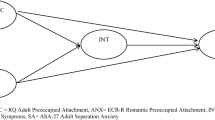Abstract
This study explores intrapsychic structures underlying Marcia's ego identity statuses in terms of separation-individuation patterns. It was hypothesized that achievement and moratorium adolescents would give greater evidence of intrapsychic differentiation on a projective measure of separation anxiety than would foreclosure or diffusion youths. Marcia's Ego Identity Status Interview and Hansburg's Separation Anxiety Test were administered to 80 female and 60 male volunteers at a New Zealand university. All were under 23 years of age. As predicted, high statuses showed less anxiety than secure attachment or detachment. Contrary to expectation, no differences among attachment styles appeared for low statuses. Difficulties in adapting the identity status interview to the New Zealand context may partially explain these results. A measure of intrapsychic differentiation provides a useful supplement to the identity status interview.
Similar content being viewed by others
References
Bettleheim, B. (1969).The Children of the Dream Macmillan, London.
Blos, P. (1967). The second individuation process of adolescence.Psychoanal. Stud. Child 22: 162–186.
Bourne, E. (1978a). The state of research on ego identity: A review and appraisal. Part I.J. Youth Adoles. 7: 221–251.
Bourne, E. (1978b). The state of research on ego identity: A review and appraisal. Part II.J. Youth Adoles. 7: 371–392.
Chapman, J. W., and Nicholls, J. G. (1976). Occupational identity status, occupational preference, and field dependence in Maori and Pakeha boys.J. Cross-Cult. Psychol. 7: 61–72.
Chasseguet-Smirgel, J. (1970).Female Sexuality University of Michigan Press, Ann Arbor.
Chodorow, N. (1978).The Reproduction of Mothering University of California Press, Berkeley.
Currie, P. S. (1983). Current attachment patterns, attachment history, and religiosity as predictors of ego-identity status in fundamentalist Christian adolescents. Unpublished doctorial dissertation, California School of Professional Psychology, Los Angeles.
Erikson, E. H. (1968).Identity, Youth, and Crisis Norton, New York.
Esman, A. H. (1980). Adolescent psychopathology and the rapprochement phenomenon. In Feinstein, S. C., Giovacchini, P. C., Looney, J. C., Schwartzberg, A. Z., and Sorosky, A. D. (eds.),Adolescent Psychiatry, Vol. 8, University of Chicago Press, Chicago.
Evans, J. (1982).Adolescent and Pre-Adolescent Psychiatry Academic Press, London.
Gilligan, C. (1982).In a Different Voice: Psychological Theory and Women's Development Harvard University Press, Cambridge, Mass.
Ginsberg, S. D., and Orlofsky, J. L. (1981). Ego identity status, ego development, and locus of control in college women.J. Youth Adoles. 10: 197–307.
Grotevant, H. D., and Cooper, C. R. (1981). Assessing adolescent identity in the areas of occupation, religion, politics, friendships, dating, and sex roles: Manual for administration and coding of the interviews. JSASCat. Select. Documents Psychol. 11: 50, (Ms. No. 2295).
Hansburg, H. G. (1980a).Adolescent Separation Anxiety: A Method for the Study of Adolescent Separation Problems, Vol. 1, Robert E. Krieger, New York.
Hansburg, H. G. (1980b).Adolescent Separation Anxiety: Separation Disorders, Vol. 2, Robert E. Krieger, New York.
Hansburg, H. G. (1980c).Adolescent Separation Anxiety Test Robert E. Krieger, New York.
Jordan, D. (1970). Parental antecedents of ego identity formation. Unpublished master's thesis, State University of New York at Buffalo.
Jordan, D. (1971). Parental antecedents and personality characteristics of ego identity statuses. Unpublished doctoral dissertation, State University of New York at Buffalo.
Josselson, R. (1973). Psychodynamic aspects of identity formation in college women.J. Youth Adoles. 2: 3–52.
Josselson, R. (1980). Ego development in adolescence. In Adelson, J. (ed.),Handbook of Adolescent Psychology Wiley, New York.
Josselson, R. (1982). Personality structure and identity status in women as viewed through early memories.J. Youth Adoles. 11: 293–299.
Kegan, R. (1982).The Evolving Self: Problem and Process in Human Development Harvard University Press, Cambridge, Mass.
Kroger, J. (1983). A developmental study of identity formation among late adolescent and adult women. JSASPsychological Documents 13: (Ms. No. 2537).
Kroger, J. (1985). Sex differences in the relative importance of ego identity status content areas. Unpublished manuscript.
Lebe, D. (1982). Individuation of women.Psychoanal. Rev. 69: 63–72.
Levitz-Jones, E. M., and Orlofsky, J. L. (in press). Separation-individuation and intimacy capacity in college women.J. Personal. Soc. Psychol.
Mahler, M., Pine, F., and Bergman, A. (1975).The Psychological Birth of the Human Infant Basic Books, New York.
Marcia, J. E. (1964). Determination and construct validity of ego identity status. Unpublished doctoral dissertation, The Ohio State University.
Marcia, J. E. (1966). Development and validation of ego identity status.J. Personal. Soc. Psychol. 3: 551–558.
Marcia, J. E. (1976). Studies in ego identity. Unpublished research monograph, Simon Fraser University.
Marcia, J. E. (1980). Identity in adolescence. In Adelson, J. (ed.),Handbook of Adolescent Psychology Wiley, New York.
Matteson, D. R. (1974).Alienation vs. Exploration and commitment: Personality and Family Corrolaries of Adolescent Identity Statuses, Rapport fra Projekt for Ungdomsforskring, Royal Danish School of Educational Studies, Copenhagen.
Matteson, D. R. (1977). Exploration and commitment: Sex differences and methodological problems in the use of identity status categories.J. Youth Adoles. 6: 353–374.
Orlofsky, J. L. (1976). Intimacy status: Relationship to interpersonal perception.J. Youth Adoles. 5: 73–88.
Orlofsky, J. L. (1978). The relationship between intimacy status and antecedent personality components.Adolescence 13: 419–446.
Orlofsky, J. L., Marcia, J. E., and Lesser, I. M. (1973). Ego identity status and the intimacy versus isolation crisis of young adulthood.J. Personal. Soc. Psychol. 27: 211–219.
Podd, M. H., Marcia, J. E., and Rubin, B. M. (1970). The effects of ego identity and partner perception on a prisoner's dilemma game.J. Soc. Psychol. 82: 117–126.
Schenkel, S., and Marcia, J. E. (1972). Attitudes toward premarital intercourse in determining ego identity status in college women.J. Personal. 3: 472–482.
Waterman, A. S. (1982). Identity development from adolescence to adulthood: An extension of theory and review of research.Dev. Psychol. 18: 341–358.
Author information
Authors and Affiliations
Additional information
This research was supported by a grant from the Internal Research Committee, Victoria University of Wellington. Parts of this research were presented at the Biennial Meeting of the Society for Research in Child Development, Toronto, 1985.
Received Ph.D in child development from Florida State University in 1977. Current research interest is identity formation from a lifespan perspective.
Rights and permissions
About this article
Cite this article
Kroger, J. Separation-individuation and ego identity status in New Zealand university students. J Youth Adolescence 14, 133–147 (1985). https://doi.org/10.1007/BF02098653
Received:
Accepted:
Issue Date:
DOI: https://doi.org/10.1007/BF02098653




